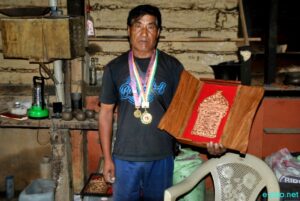Meet Machihan Sasa, the “Earthen Alchemist” of Manipur. Sasa, a master potter from Longpi Kajui village in Ukhrul district, has spent his life preserving and revitalizing the ancient Longpi pottery tradition. This unique craft, which dates back to around 10,000 BC, is more than just pottery—it’s a vital part of Manipur’s cultural heritage. Thanks to Sasa’s dedication, Longpi pottery is thriving, providing sustainable livelihoods and keeping a beautiful tradition alive.

Early Life and Background
Machihan Sasa was born on April 10, 1950, in Longpi Kajui village. Growing up in a family of potters, he was immersed in the world of pottery from a young age. He learned the craft from his father and grandfather, starting his journey into pottery-making at 20 years old under their expert guidance. This family legacy planted the seeds of his lifelong passion for Longpi pottery.
The Art of Longpi Pottery
Longpi pottery is unique. It uses black serpentine stone and brown clay, and it’s all done without a potter’s wheel. This technique is a hallmark of the Tangkhul Naga community and has been handed down through generations. The pottery not only looks beautiful but also has practical benefits. Cooking in Longpi pottery can enhance the flavor of food, and its non-stick properties make it a favorite in kitchens.
Sasa has taken this traditional craft and added his own innovative touch. He’s expanded the range of Longpi pottery products, creating everything from cooking pots to teacups and decorative items. By incorporating designs inspired by Manipuri folk art, Sasa has breathed new life into this ancient tradition.
Contributions to the Community
Sasa’s impact goes beyond creating beautiful pottery. He has trained over 300 people in the art of Longpi pottery, reviving a fading tradition and providing sustainable livelihoods for many in his village. His work has empowered people to embrace pottery as a source of income and pride.
Moreover, Sasa is a cultural guardian. He ensures that the rich heritage of Longpi pottery is preserved and passed on to future generations. His dedication has inspired many young artisans to continue this craft, securing its future.
Recognition and Awards
Machihan Sasa’s exceptional contributions haven’t gone unnoticed. In 2024, he was awarded the prestigious Padma Shri by the Government of India for his outstanding work in pottery. In 2010, he received the Shilp Guru Award, a testament to his mastery and promotion of traditional Indian handicrafts. These, along with numerous other national and state awards, highlight his status as a master craftsman.
Legacy and Vision
Sasa’s work has significantly impacted his community, blending cultural preservation with economic sustainability. He envisions teaching more young people the art of Longpi pottery, ensuring this unique craft continues to thrive. Sasa dreams of expanding Longpi pottery’s reach, both within India and internationally.
Conclusion
Machihan Sasa is a symbol of cultural preservation and innovation. His dedication to Longpi pottery has enriched Manipur’s cultural landscape and inspired countless individuals to continue this beautiful tradition. As he continues to inspire future generations, the legacy of Longpi pottery remains secure, thanks to this remarkable artisan.





